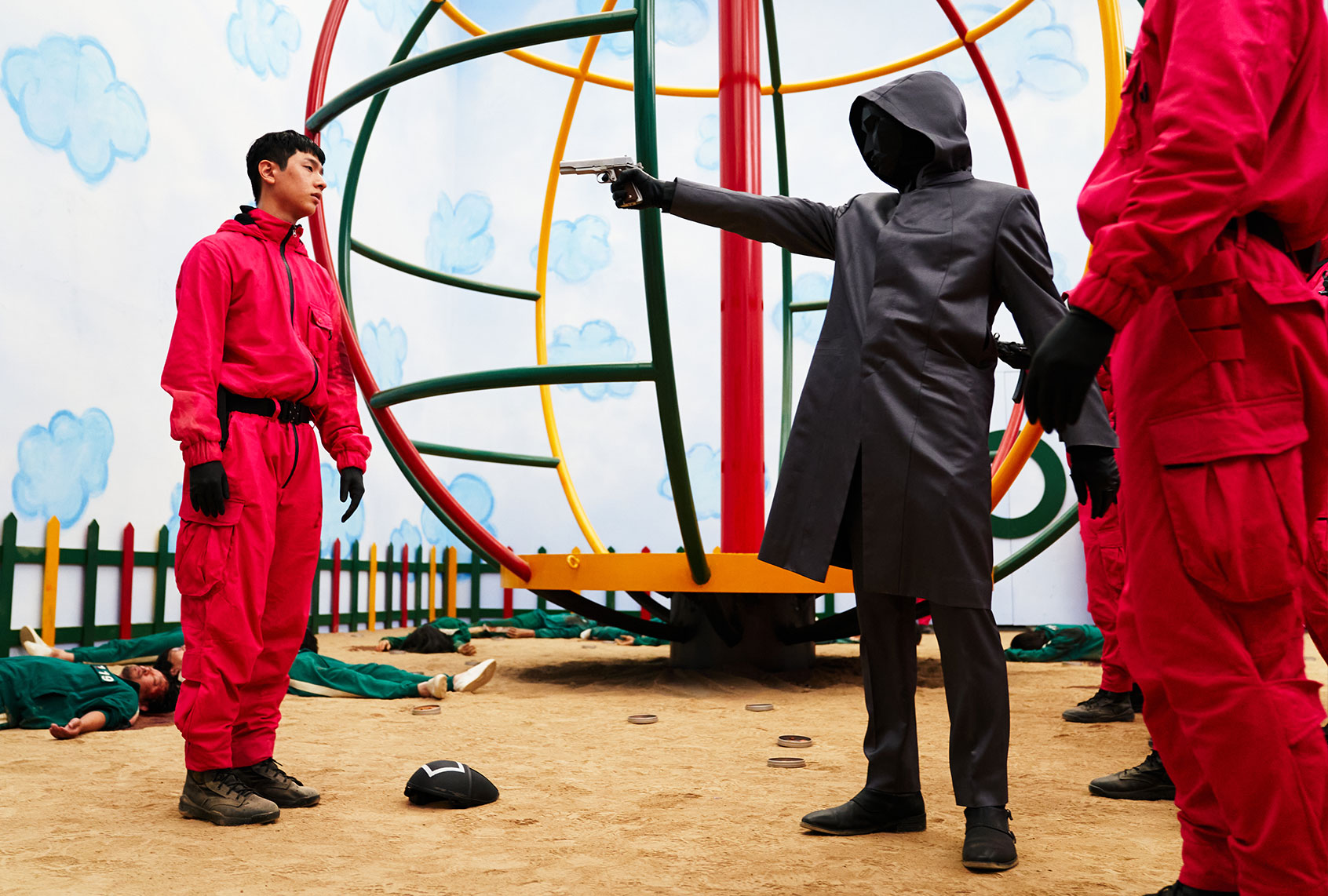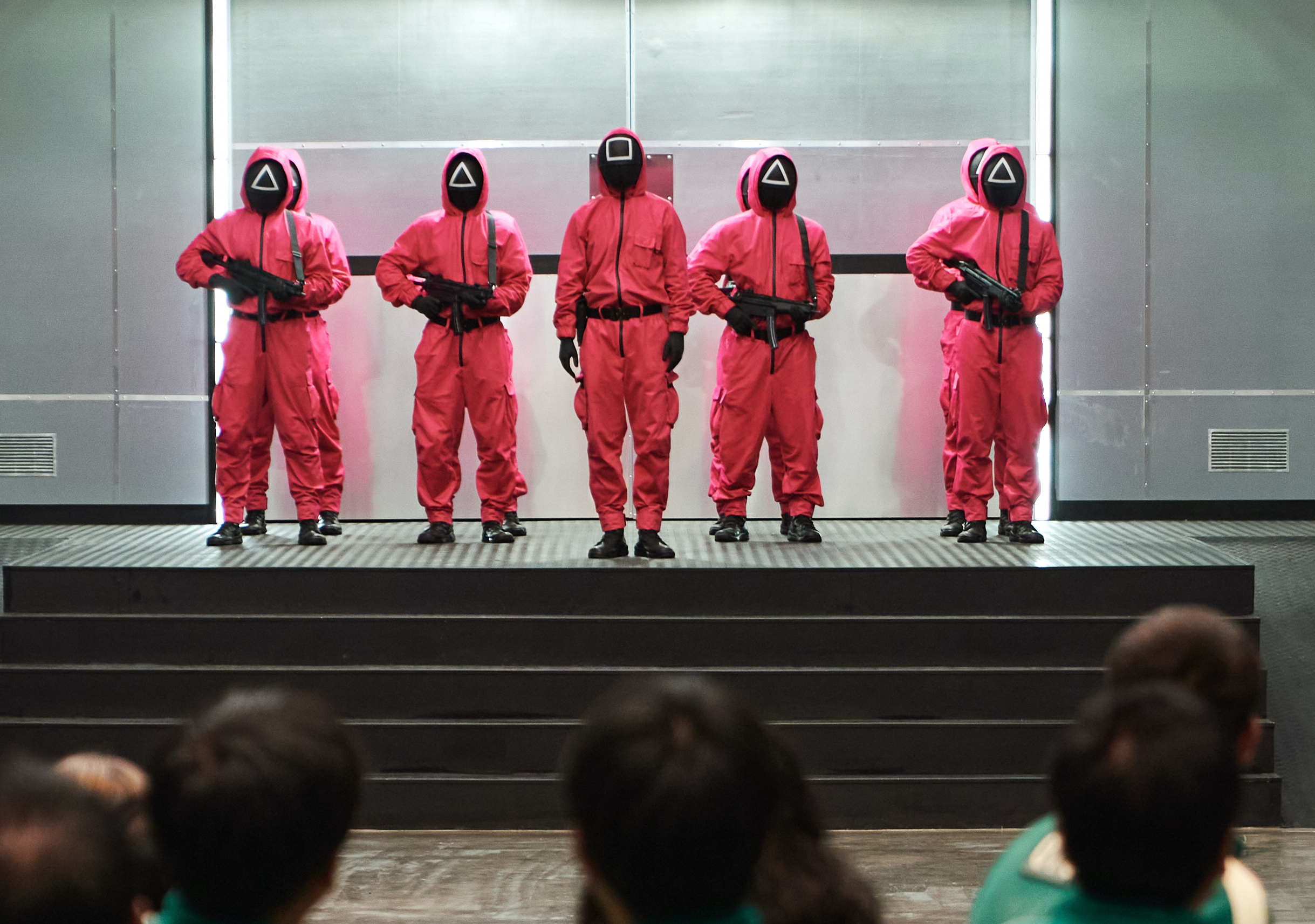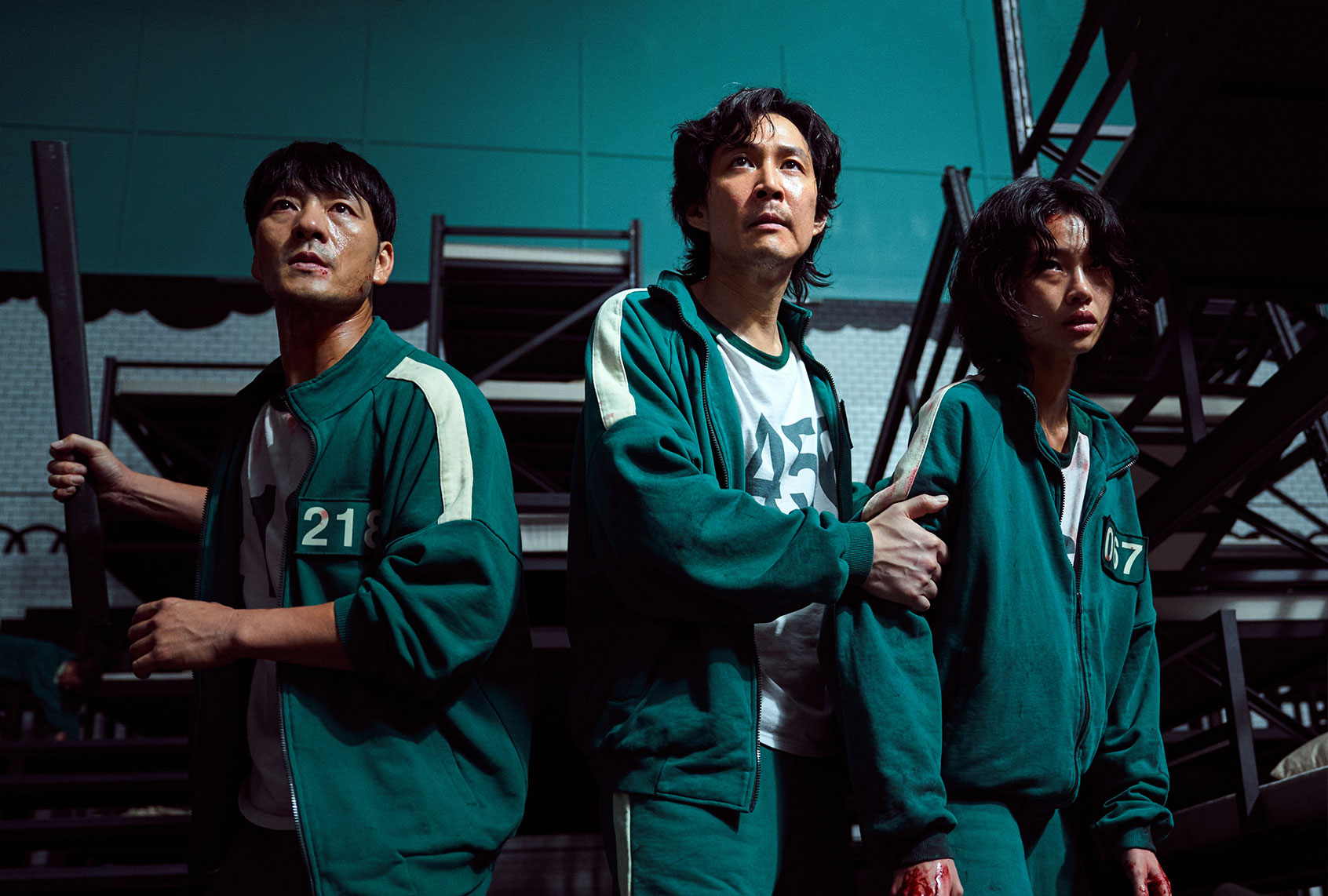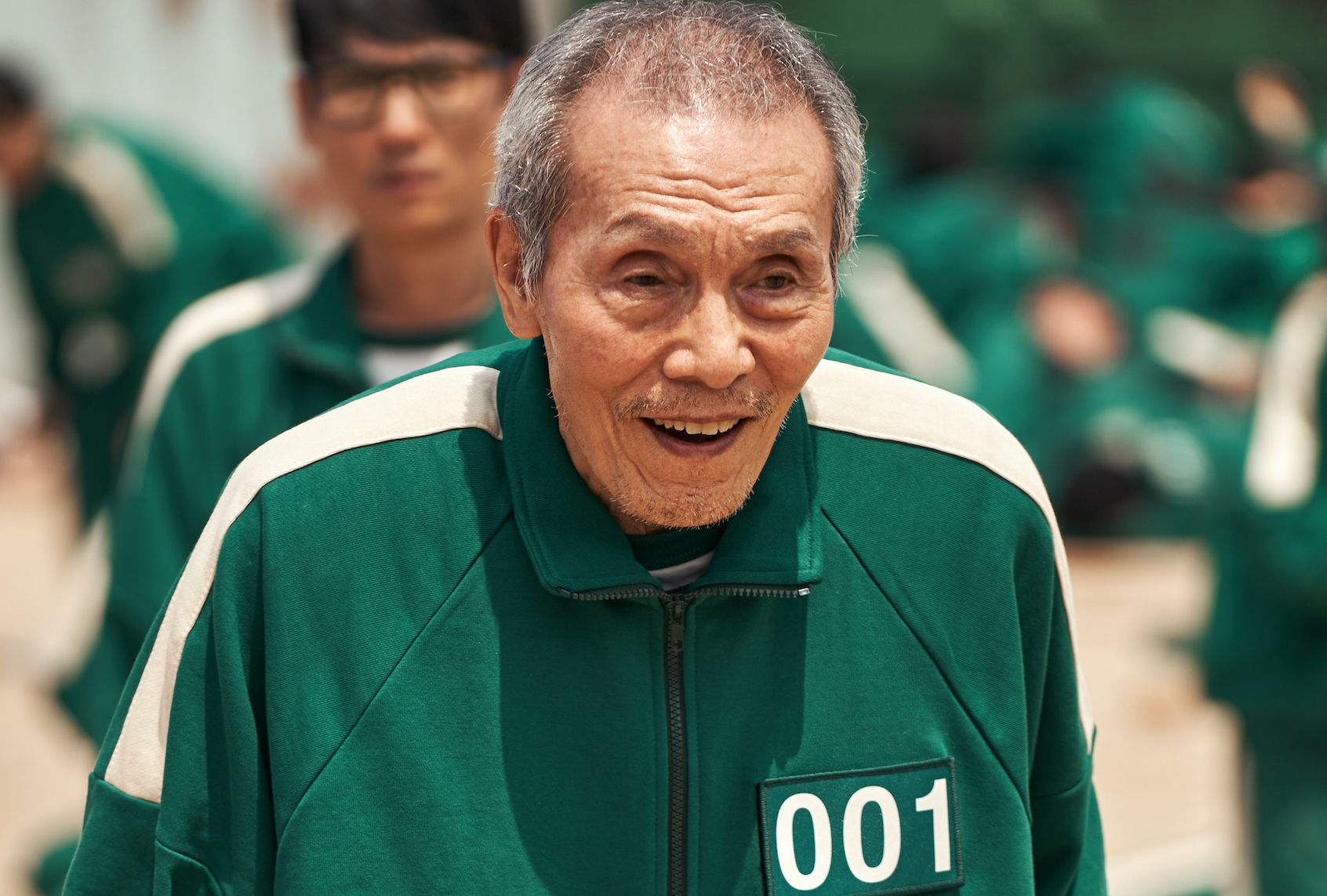Netflix has been in the news a lot of late, in part for the runaway global success of South Korean drama “Squid Game.” The series’ sadistic premise of having desperate, impoverishsed people competing in deadly games for a chance at winning millions – all for the entertainment of a mysterious, wealthy elite – immediately captured the world’s imagination. It’s prompted hilarious memes, while simultaneously inspiring conversations about capitalism and inequality.
But just as the spotlight has been shining on that achievement, it’s also glared upon the darker side of the streaming service. Dave Chappelle’s comedy special “The Closer” received backlash for his bizarre fixation with attacking the LGBTQ+ community, particularly devoting a significant amount of time on transphobic material. While this content was bad enough, Netflix’s co-CEO Ted Sarandos released an initial statement supporting the offensive special, and shortly afterward doubled-down and defended it again in a Variety interview, convinced that he knew better about what affected the trans community than the community itself.
RELATED: Dave Chappelle and the warped self-victimhood of transphobes
Needless to say, having such an influential, global company supporting such harmful speech – especially at a time of surging violence and political attacks on trans people – created an even greater furor. Since then, the Verge reports Netflix has fired a trans employee, helping to spark a full-day employee walkout and boycott of Netflix by supportive consumers on Wednesday.
Oddly enough, much of this backlash seems to have taken Netflix by surprise; it’s a company that is supposedly known for its supportive workplace culture. How then, did all of this come to pass?
Perhaps the biggest clue about the widening gulf between Netflix’s leadership and its employees emerged over this past week, as Netflix executives appeared to dress in the signature green “Squid Game” tracksuits on a remote Zoom earnings call. On the surface, this is nothing but a bit of fun, as co-CEO Reed Hastings has a penchant for appearing on these calls in clothing promoting Netflix shows, ranging from “Stranger Things” to “BoJack Horseman.” Spencer Wang, the service’s VP of investor relations and corporate development, was similarly attired.
Yes, @reedhastings and Netflix IR’s Spencer Wang are wearing Squid Game track suits on the streamer’s earnings interview. pic.twitter.com/BqYjsgyOyr
— TVMoJoe (@TVMoJoe) October 19, 2021
Had the past few weeks been business as usual for Netflix, this would have passed as nothing more than synergistic pre-Halloween dress-up. However, with the $283 billion company receiving so much negative press and attention lately, the costuming carried extra weight. In “Squid Game,” it’s the impoverished contestants risking their lives who wear the green tracksuits. Hastings and Wang doing so at a time when Netflix execs have been ignoring the pleas of its most vulnerable employees took on a sick, out-of-touch sigificance.
Many have decried it as a sort of poverty-class cosplay and pointed out the execs should’ve instead dressed as the “Squid Game” VIPs whose affluence fuels the death games. While it’s an imperfect metaphor, anything “Squid Game” is speaking Netflix’s language these days. Therefore, taking a closer look at how the elite are portrayed on the show could shed some light on ways that Netflix’s leadership operates and is perceived.
“Squid Game” VIPs and Netflix execs call the shots
 Front Man punishes a worker who broke the rules (Noh Juhan/Netflix)
Front Man punishes a worker who broke the rules (Noh Juhan/Netflix)
Let’s review, shall we? The mysterious VIPs of “Squid Game” are a group of vastly wealthy people, mostly men, whose gambling funds the death game operations. When they visit the South Korean operations as spectators to the final matches they don elaborate, terrifying masks of animal predators to conceal their own identities.
The South Korean-based VIP actually runs the operation, with the dark-hooded Front Man who is seen ensuring the proper gameplay day-to-day. He commands the pink jumpsuit-wearing workers who faciliate the games and keep the competitors in line under threat of force. Sadly, these employees who wear dark, fencing-style masks live a bleak existence and are presumably as exploited and option-less as the contestants they govern.
If the workers have friends or families, they don’t see them for the duration of gameplay. Instead, the workers are forced to reside in tiny, Spartan dormitories akin to prison cells at the on-site facilities on an island only reachable by ferry. An elaborate system of cameras capture their every moment – whether it’s in bed or walking along the hallway – and those monitoring the cameras are their fellow workers.
They must also abide by a strict set of rules and company policies . . . or else. A couple workers are killed as punishment for helping a contestant in the games. But even something as simple as removing one’s mask outside of one’s dormitory is forbidden. When one worker has his mask forced off by a contestant during gameplay, Front Man is merciless. He shoots the loyal employee point-blank in the face. Rules are rules.
Obviously, Netflix doesn’t go to those extremes, and we’re not saying that they do. But there are plenty of examples and evidence of protocol meant to control the work environment and keep workers biddable. The company’s campus, like many tech companies and start-ups, reportedly provides all kinds of seemingly lavish and generous amenities, such as: providing a wide range of complimentary foods and beverages at all times, chargers and tech gadgets, Japanese-style heated toilet seats and other comfortable amenities that make the offices feel like home — including an open invite for employees to bring their dogs.
On the surface this is great, and may even foster a sense of togetherness, but are ultimately ways to keep employees at the office and near their work. Consequently, this discourages them from going home and resting or having more balanced lives.
And if one is perceived to have stepped out of line, well, action is swift. More recently, the company suspended three employees for allegedly attempting to crash a virtual meeting with top execs, according to the New York Times. One of them is Terra Field, a trans woman who has been outspoken about the harm that Chapelle’s special causes to the trans community.
It wasn’t revealed until later that the employees had been emailed the link to this virtual meeting and therefore thought they had been invited to attend. Once the employees were reinstated, Field had Netflix put that significant fact into writing so that her name would be cleared.
One employee hasn’t been so fortunate. Netflix fired an unnamed employee – who spoke out against the company’s support for “The Closer” – claiming that the worker had leaked metrics to Bloomberg about the cost of its programming. The report shows that Netflix has a reason to back Chappelle, and it’s not necessarily an artistic one. The company had spent a staggering $24.1 million on “The Closer” and $23.6 million on Chappelle’s 2019 special, “Sticks & Stones,” compared with $3.9 million on Bo Burnham’s “Inside” special, and $21.4 million on “Squid Game.”
The statement given by a spokesperson about the leak makes it clear how the employee’s concerns are dismissed as merely a personal pique.
“We have let go of an employee for sharing confidential, commercially sensitive information outside the company,” Netflix told The Hollywood Reporter. “We understand this employee may have been motivated by disappointment and hurt with Netflix, but maintaining a culture of trust and transparency is core to our company.”
“Trust” is an interesting word here, and bears further investigation.
Superficial support and false notions of equality

The workers who help run “Squid Game” (Noh Juhan/Netflix)
In order to keep the action alive in “Squid Game,” the head VIP and Front Man perpetuate a narrative of equality. First, they keep the workers wearing their masks so they don’t reveal anything about the games to the contestants or form relationships with them that can be advantageous. The masks and pink jumpsuits act like a uniform, making it appear that all the workers are the same.
But the geometric shapes decorating the masks reveal a hierarchy. A circle denotes a grunt worker – a drone with no authority who basically is a body to serve food or move corpses. They are not allowed to speak unless a superior asks a question or gives a command. A triangle is a step above, a guard who is allowed a firearm to intimidate and when needed, execute the contestants when they fail at a game. Finally, a square denotes command, those who give the orders.
Meanwhile, the contestants also have a uniform, the aforementioned green tracksuits, and are issued numbers instead of having their outside identities acknowledged. This helps to sell an idea of equality – that everyone comes in without any material things that could give them an advantage – and therefore have a “fair” chance at the $40 million pot.
Whenever players are revealed to have any kind of advantage, they may be punished or killed. Take, for example the doctor, Byeong-gi or 111 (Yoo Sung-joo), whom workers help to cheat so that he can harvest organs from the eliminated players. Front Man kills him. Then, when Player 017 (Lee Sang-hee), a glassmaker, is able to perceive differences in a glass bridge, Front Man changes the lighting that gave him the advantage.
The problem, of course, is that just like in our world, many people have advantages that aren’t acknowledged, owing much of it to privilege. The men are bigger and stronger, which is an advantage in the tug o’ war contest. Some players were raised more comfortably, and therefore have the benefit of better education, a point that sketchy subtitling glossed over. But Front Man doesn’t do anything about those advantages, abiding by the idea that bootstrapping, just trying and applying oneself is all it takes for success. Some 455 dead players by the end of the game would probably like to argue with the idea that they didn’t try hard enough.
 Squid Game (YOUNGKYU PARK / Netflix)
Squid Game (YOUNGKYU PARK / Netflix)
Equality apparently is just an illusion in “Squid Game” — just as it is at Netflix, as a workplace.
The company offers similar stories and narratives of equity, inclusion and support. Its lineup certainly tries to provide something for everyone, and has been lauded for queer-friendly programming like the groundbreaking “Disclosure” documentary and shows like “Sex Education,” both of which have advanced the discussion of transgender issues. The company similarly hires a diverse workforce, many of whom are queer or transgender. Netflix claims to value and support queer employees’ struggles and by publicly pushing out its LGBTQ programming via its social media channels such as the queer-specific @Most on Twitter.
Want a daily wrap-up of all the news and commentary Salon has to offer? Subscribe to our morning newsletter, Crash Course.
So where was this much-vaunted “trust” when several employees brought the inflammatory and damaging nature of “The Closer” to execs’ attention before it premiered?
Instead of trusting the word of employees who may have a stake in harm done to their own community or those of their friends, Netflix instead downplayed those concerns. In one of Sarandos’ defenses of “The Closer,” he said in a company-wide email, “content doesn’t directly translate to real-world harm,” reports NBC. This, of course, willfully ignores how culture and comedy directly create the social conditions under which anti-trans violence is acceptable. In fact, “Disclosure” literally addresses how Hollywood depictions have led to harm in the trans community.
By their actions, Sarandos and other Netflix executives demonstrate that their supposed kinship and connection with its queer employees and creators is a smokescreen, a game. The company is famously supportive of its onscreen talent, often helping small names become big stars or casting and recasting the same folks from within its network. But Netflix’s defensiveness of Chappelle is indicative of how this unwavering support for its biggest names is at the expense of its less famous employees.
Trust, it seems, only goes one way.
Netflix wants to trust its employees or they pay the price. But employees can’t trust the higher-ups to protect them or offer a safe work environment, especially if harmful specials like “The Closer” continue to be made in the name of comedy or, let’s be real, profit. To highlight this precarious position, just this week, the trans employees who helped to stage the company-wide walkout also issued a list of very basic demands. Pulling “The Closer” from the service was not on the list.
Instead, they appear to ask Netflix for the bare minimum in actually supporting transgender causes, safety and empathy. The demands range from investing in trans and nonbinary talent to providing content warnings for transphobic and otherwise wildly bigoted content. These demands highlight a disturbing level of disconnect between Netflix leadership and the basic needs of their employees who feel their bosses don’t recognize their humanity.
It’s a chasm that exposes the vast inequality of power within the company, despite how Netflix has very publicly prided itself for years about its supposed bold inclusivity, posturing as the protagonist of its own narrative — all while queer and trans employees have been drowning.
The ultimate cosplayer
 Oh Young-soo, aka No. 001 or Oh Il-nam, in “Squid Game” (Noh Juhan/Netflix)
Oh Young-soo, aka No. 001 or Oh Il-nam, in “Squid Game” (Noh Juhan/Netflix)
But it’s one “Squid Game” character in particular who provides the most insight into the inconsistency with the Netflix executives.
Viewers are first introduced to 001 (Yeong-su Oh), an affable old man with terminal brain cancer, in the first episode when he befriends the contestants and builds a special bond with the show’s protagonist, Seong Gi-hun, or Player 456 (Lee Jung-jae). Even though he’s fairly frail and poses no threat to the others, over time he’s shown to be a tenacious and clever player, even helping his team win against a group of burly men in a tug o’ war using clever strategy.
It’s particularly heartbreaking then, when Gi-hun and 001 team up for a game, which is only later revealed to be a competition between the two of them. The loser is eliminated, aka executed. Gi-hun makes sure that he survives, which means that he feels responsible for the death of his friend.
But after Gi-hun wins the entire game, he once again comes face-to-face with 001, whom he thought was dead. It’s revealed that the old man is Oh Il-nam, who won the Squid Game years ago. The incredible amount of wealth he won and the ability to buy anything, however, had left him bored with life, and thus as the top VIP began funding the game every year, gambling on the fate of people as if they were animals in a race.
Boredom and his looming death led him to donning the green tracksuit once again for this iteration of the Squid Game, masquerading as one of them, one of the desperate. It’s the most fun he’s had in years. He even makes an excuse to get out of hosting when the foreign VIPs visit, preferring to play the game with his green-clad pals instead.
But of course he’s never in any real danger. We see that during a dormitory riot turned into a murder free-for-all, when 001 climbs to the top of a barricade of bunk beds and screams for everyone to stop. It’s only when Front Man hears his boss’ order on the monitor does he then send in the guards to intervene. See, when 001 ultimately tires of playing the games — which makes sense because they’re all, you know, terrifying — all he has to do is leave. If anyone else wants to leave, their options include dying in the games or getting shot in the head by the guards.
And when 001 is ultimately eliminated in the marbles game, we only hear the shot offscreen, while we witness every other player’s shot to the head. No doubt 001 took great glee in watching his guards fire their guns into empty air. Hell, he may have even shot the gun himself before heading back to his cozy luxury apartment. This is impoverished cosplay at its most horrifying.
And though Netflix isn’t backing any real-life murder games, the actions of its executives have shown a preference for protecting the already privileged, not the employees who need the most while asking for the least. The company’s more recent betrayals of its queer and trans employees expose how its facade of supportiveness has always been a performance, not unlike its execs dressing in the “Squid Game” contestant costumes.
And really, at the end of the day, what is the difference between a multi-millionaire pretending to relate to hordes of impoverished people willing to die for a chance at wealth, and a Netflix CEO who pretends to relate to and support queer employees when it’s advantageous to do so, and throw them under the bus when it’s not? In wearing the “Squid Game” contestant costumes while hoarding wealth and subjecting its employees to highly questionable conditions, Netflix executives might just have inadvertently provided the social commentary of the year.
More stories like this:
- Trans Day of Visibility offers chance for community to stand in solidarity and support
- “Squid Game”: The real debt crisis shaking South Korea that inspired the hit TV show
- The women in “Squid Game” deserve better than their supposedly heroic acts onscreen
- Big Oil is awash in rainbows for Pride Month


